| Srl | Item |
| 1 |
ID:
160460
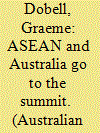

|
|
|
|
|
| Summary/Abstract |
South-East Asia is where Australia’s geography collides with our future. And South-East Asia acts as the threshold for what Australia faces in the Asian century. The ASEAN (Association of Southeast Asian Nations) summit in Sydney in March 2018 was the first on Australian soil. Yet it was a meeting based on a lot of shared history over ASEAN’s 50 years.
|
|
|
|
|
|
|
|
|
|
|
|
|
|
|
|
| 2 |
ID:
160461
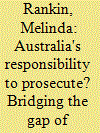

|
|
|
|
|
| Summary/Abstract |
Australia's defence and foreign policy emphasises a rules-based global order—one that includes a responsibility to protect and upholding international criminal and humanitarian law (ICHL).
|
|
|
|
|
|
|
|
|
|
|
|
|
|
|
|
| 3 |
ID:
160465
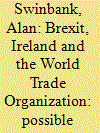

|
|
|
|
|
| Summary/Abstract |
Prior to the UK’s accession to the then European Economic Community in 1973, Australia was a significant supplier of Britain’s food. Membership of the European Union (EU) resulted in trade diversion, closing the British market to Australian sugar, for example. This article questions whether the UK’s exit from the EU (‘Brexit’) might usher in a new agri-food trade regime, restoring Australian farmers’ access to the British market, or whether other opposing political economy considerations might prevail. Would the UK unilaterally adopt free trade? Can a comprehensive free trade area agreement between Australia and the UK, including agri-food products, be negotiated? Any new relationship will need to reflect the UK government’s stated preference for a frictionless border with EU 27 (particularly on the island of Ireland), the World Trade Organization’s rule book, and the interests of the UK’s farm lobbies, as well as the UK’s quest for ‘free trade’ with the wider international community.
|
|
|
|
|
|
|
|
|
|
|
|
|
|
|
|
| 4 |
ID:
160464
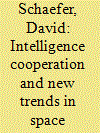

|
|
|
|
|
| Summary/Abstract |
For the first time since the 1970s, Canberra cannot assume the joint facilities will continue to underpin the Australia–US alliance. Intelligence cooperation via outer space, described as the ‘strategic essence’ of this relationship, is poised for transformation. New technologies are being developed for satellite communication, with laser systems capable of bypassing ground control stations outside US territory. As a result, the one indispensable role for Australia in US national security—hosting infrastructure to relay intelligence about nuclear and missile activity—could become irrelevant in the years ahead. With questions raised about the Trump administration’s commitment to security partners and the risk of US disengagement from Asia, these findings have implications for Australian alliance diplomacy. If intelligence ties bind these countries together at present, Canberra can expect some risk of loosening in the future and will need to think carefully about the development of national intelligence resources over the long term.
|
|
|
|
|
|
|
|
|
|
|
|
|
|
|
|
| 5 |
ID:
160463


|
|
|
|
|
| Summary/Abstract |
This article examines how role theory can enhance the middle-power literature in understanding the role preferences of middle powers. Rather than treating it as merely a function of material capability or good international citizenship, this article resituates middle power as a concept of international status that states aim to pursue through the enactment of role conceptions. Thus, it reinstates a conceptual distinction between ‘middle-power status’ and ‘middle-power roles’. The article suggests that the notion of role conceptions can analytically connect the status-seeking behaviour of middle powers with their foreign policy agenda. In so doing, it provides a more nuanced explanation of middle-power behaviour, which might differ between one middle power and another. Using Indonesia and South Korea as case studies of middle power, this article contends that foreign policymakers have strategically conceptualised and enacted several main roles that aim to capture historical experience, as well as ego and alter expectations, in order to pursue middle-power status. These role conceptions determine the foreign policy agenda of states in articulating their middle-power status.
|
|
|
|
|
|
|
|
|
|
|
|
|
|
|
|
| 6 |
ID:
160459
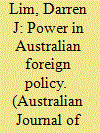

|
|
|
|
|
| Summary/Abstract |
The 2017 Foreign Policy White Paper emphasises the importance of ‘maximising’ Australia’s power and influence. However, the White Paper and much of the commentary on Australian foreign policy do not clearly conceptualise ‘power’ or indicate how it ought to be increased. The Lowy Institute’s recent Asia Power Index implies one possible strategy via its resource-based approach to measuring power. We outline a different approach and argue that power should be conceptualised and evaluated as a specific relationship causing behavioural change, rather than as a general attribute of its wielder. To complement the Lowy Institute’s carefully catalogued database, and facilitate a more focused conversation about maximising power and influence in Australian foreign policy, we offer a typology identifying five pathways through which states can translate their material and non-material resources into outcomes that serve the national interest.
|
|
|
|
|
|
|
|
|
|
|
|
|
|
|
|
| 7 |
ID:
160462
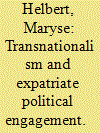

|
|
|
|
|
| Summary/Abstract |
The aim of this article is to provide an appreciation and analysis of the expatriate connectivity of Italian and French citizens from their place of residence in Australia through their respective elections in their home countries. Specifically, the article examines the case of Italians in Australia voting in the 2013 Italian elections and equally that of French citizens in Australia voting in the French presidential and the following legislative elections in 2017. The article examines the voting patterns there might be between those voting in their home country (Italy and France) and those voting in external electoral colleges (in this case, the relevant Australian college). The article shows that those living abroad—in this case, Australia—provide different political choices and less surprising low voting participation compared to the domestic districts. It also highlights that the transnational community can be, and is, influenced by the political context of their host country, which will be different from that which occurs in their home country.
|
|
|
|
|
|
|
|
|
|
|
|
|
|
|
|